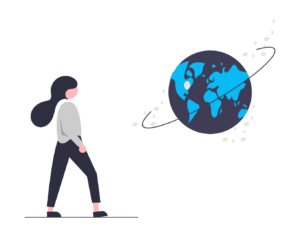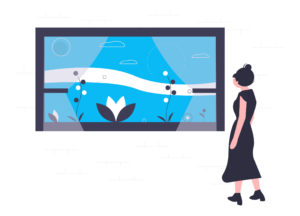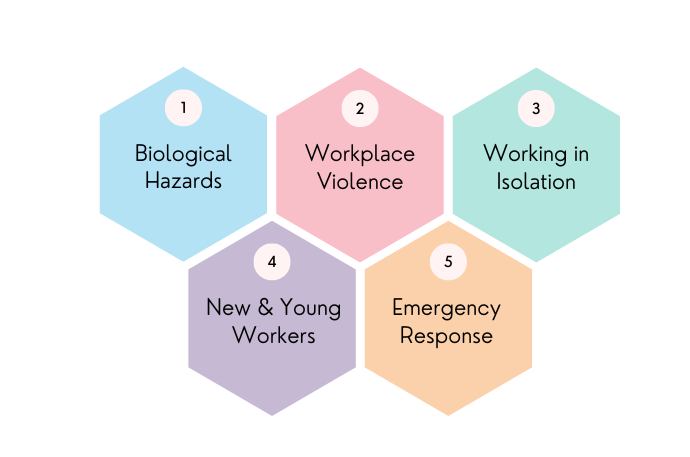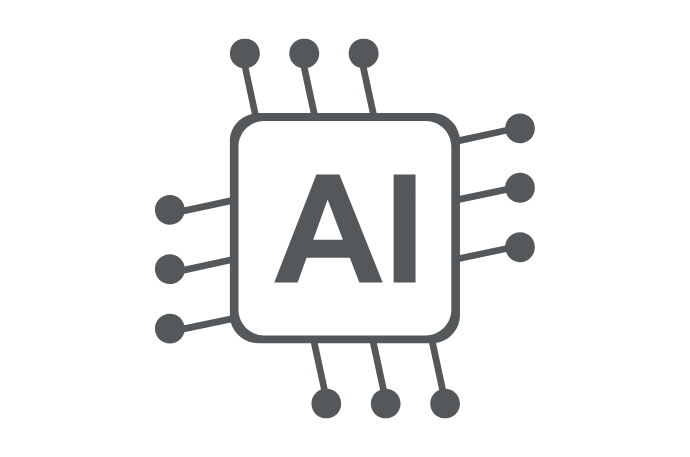Update on the BCMA’s Ongoing Commitment to Justice, Equity, Diversity, and Inclusion: January 2025
The BC Museums Association is committed to supporting justice, equity, diversity, and inclusion within the museum and cultural sector and our own organizational practices. These priorities are woven throughout our current Strategic Plan 2024-2029, which you can find here. A key component of this commitment is being open and transparent with our community. We aim to provide regular updates about our steps to support justice, equity, diversity, and inclusion. If you have feedback or would like to share your thoughts, we encourage you to contact us.
The BCMA has published regular justice, equity, diversity, and inclusion updates since 2020. To read our past updates, please visit this page.
Jump to Recent Updates
 We Have the Power to Help
We Have the Power to Help
In the days since Donald Trump was inaugurated as the 47th president of the United States, he and his administration have targeted and politicized the concepts of diversity, equity, and inclusion, issuing executive orders that ban and defund government-funded organizations that focus on DEI and placing all federal staff who work on DEI on administrative leave, a prelude to terminating their roles. In response many major American corporations have terminated their own DEI programs (notably Target, Walmart, Amazon, McDonalds, and Meta) and federally-funded cultural institutions (like the National Gallery) have terminated similar equity-focused programs. With Trump threatening to defund colleges and universities that do not terminate DEI programs, it appears that this new phase of the ongoing cultural war may be only just beginning.
While British Columbia and Canada are currently in a different political climate than the one being created by the new US administration, so much of the global political, cultural, financial, and social discourse is set by the United States. Corporations and institutions that posted black squares during the summer of 2020 and made sudden commitments to equity to avoid PR backlash now feel emboldened to end even the most modest and half-hearted of efforts.
In the face of this very different political climate, it is more important than ever that organizations and institutions commit to equity and speak boldly about the work they are doing. The BCMA has been writing regular JEDI updates for nearly five years and now feels like an appropriate time to reflect on why we do this. Our first equity statement was the BCMA Anti-Racism Statement: October 2020. In it we wrote;
“We recognize that racism is pervasive in our field and in our society, but we are also keenly aware that the BCMA lacks the experience and diversity to be a voice that can speak on behalf of those who face discrimination. While we cannot speak on behalf of IBPOC museum professionals, we can provide our unwavering support and belief, and a platform to amplify these critical voices.”
We are in a time where a lot of support and belief is wavering and it seems likely that things are going to get worse before they get better. On top of all this, our sector is struggling with declining government funding, challenges attracting and retaining audiences, and what feels like an ever-growing list of existential threats. While it might feel like an impossible task for one individual or one organization to make a difference, we have the power to help.
 Every child who visits your institution and learns something about the world, helps.
Every child who visits your institution and learns something about the world, helps.
Every senior who finds meaning and community by volunteering, helps.
Every text panel you make just a tiny bit better, helps.
Every summer student you give a first job to, helps.
Every artist you employ, helps.
Every smile you create, helps.
The people who want to consolidate their personal power and who want to regress society back to a mythical past want to overwhelm us until we give up. The work that museums, galleries, and heritage organizations are doing in their communities has always been important, but right now it is more critical than ever. If regressive elements of society didn’t see equity, access, and reconciliation as a real threat to their power, they wouldn’t work so hard to ban it.
 Reflecting on Five Years of Updates
Reflecting on Five Years of Updates
Looking back on the past few years, what has the BCMA done to centre justice, equity, diversity and inclusion?
Since 2020, we have prioritized the allocation of programming funding and contracted projects to amplify diverse voices, and committed to tiered ticket pricing for conferences. We do our best to have diverse representation on discussion panels, conference sessions and other speaking opportunities to ensure multiple viewpoints on sector topics. Working in collaboration with Nations and Indigenous groups on whose lands we are hosting events has been another intentional change in how we organize sustainable events and conferences. We also write our project grant applications in a way that lets funders know we aim to use funds to compensate equity-seeking professionals and contractors fairly.
The IBPOC Cultural Professionals Network is thriving, accompanied by the 2SLGBTQIA+ Cultural Professionals Network which built on the success of the Gender & Sexuality Inclusion Toolkit. As projects like the Toolkit open windows for us to see and hear the needs of diverse professionals, we continue to strive to respond to them.
In addition to these initiatives, to ground our organization in the work of justice, equity, diversity, and inclusion, the BCMA has focused on two key goals: creating new governance resources focusing on anti-oppression and reviewing our internal systems to improve practices.
A few years ago, BCMA hired Mighty Museum to complete research on governance challenges in the sector, resulting in the report Governance Challenges and Opportunities in B.C.’s Small to Medium Non-profit Museums. We also expanded this into the recently released Research Accountability Practices report, which is explored below.
The 2021 Governance Challenges research outlines a governance “crisis” in the museum sector. One immediate response to this crisis has been the development of the Governance 101 online course in partnership with Arts BC and the Squamish Arts Council. In addition to focusing on core legal responsibilities for board members, the course attempts to centre equity-driven governance and decision-making to provide organizations with a stronger governance foundation. Since its launch in 2022, more than 30 arts, culture, and heritage organizations have registered.
The BCMA reorganized the Indigenous Culture and Heritage resources on our website, made them more accessible, and also added newly created resources like the CARE Workbook and workshops, and the Call for Repatriation. Below you can read more about our recent expansion of staff roles to provide more direct assistance.
We are committed to improving accessibility in our digital programs and resources. We have incorporated accessibility features into our online learning portal (detailed here). We provide captions and ASL interpretation for select online programming and transcripts for some podcast episodes. We have expanded hybrid/online programming such as our 2023 Digital Dialogues Series, provided free resources to make your online events and digital presence more accessible, and released an expanded online course on Digital Accessibility for Museums Galleries and Cultural Organizations. Please help us prioritize additional improvements by contacting us to provide feedback on our efforts; we update our accessibility statement when we make new changes.
To be a more equitable workplace, we have not just focused on providing an accurate description of our work environment, team culture, and values in job ads but also on finding ways to offer BCMA staff the support and flexibility to thrive in their roles. Many of these initiatives are outlined in our Equity in the Workplace resource. We also have developed an internal succession planning matrix that helps the BCMA Council to assess experiences and perspectives that we may be missing at the board table in order to ensure that our Association is equitably representing our membership.
As an organization, the BCMA attempts to speak transparently with our members and sector about the work we are doing to centre equity in all aspects of our operations and impact. These regular JEDI Updates are one way that we attempt to be accountable for the commitment we made in 2020. If we stopped writing these updates, it would remove an opportunity to check that we are working towards our strategic goals and that our work always reflects our values; accountability, bravery, equity, innovation, relevance and respect.
 Recent Updates
Recent Updates
IBPOC Network
The IBPOC Network continues to hold an accountable space for racialized staff, volunteers, and students in the sector to find support and build community. In addition to our monthly online sessions, we just wrapped up Tea and Talk On The Road for 2024 and are currently planning our 2025 Road Map. We hosted 17 in-person Tea and Talks in 2024, travelling to New Westminster, Surrey, Edmonton, Nanaimo, Calgary, Burnaby, Victoria, North Vancouver, Kelowna, Prince George, Vancouver, Richmond, and Coquitlam. We are incredibly grateful to all of our hosts! Thanks to you, the IBPOC Network was able to afford to travel to so many locations.
Our network has also teamed up with the BCMA’s 2SLGBTQIA+ Network to host joint sessions and create more intersectional spaces for our members. At our conference in Prince George in September, we co-hosted an in-person Tea and Talk that proved useful in creating community and solidarity across the two spaces. Inspired by this success, we co-hosted an Online Tea and Talk together in October, and launched Beyond The Margins: Networks Book and Media Club in December.
Joint Network Events
Connect with arts, culture, and heritage IBPOC and 2SLGBTQIA+ professionals, students, and volunteers from across British Columbia.
Lastly, our IBPOC Network Podcast has returned with a new episode! You can find “Ep. 3: Madison Bridal and Rooting For Reclamation” on our website now. This episode introduces the newest BCMA staff member to listeners, as Jazmin and Madison chat about the work behind the scenes at the IBPOC Network and Madison’s exhibit on Black artists at UVic Legacy Art Gallery. Episode 4 has been recorded and is set to release very soon. The next one will be an exciting one as we welcome in a prominent activist group, so keep your eyes peeled!
IBPOC Network Podcast Episode 3: Madison Bridal and "Rooting for Reclamation"
In this episode, Jazmin Hundal is joined by fellow BCMA team member and IBPOC Network co-coordinator Madison Bridal.
2SLGBTQIA+ Network
The 2SLGBTQIA+ Advisory Group has had a successful year of foundation building for our Network. In the first year of our advisory, we dedicated about 4 months to building our processes so that the Advisory & Network is set up to function in an accountable and equitable way. This meant establishing our values and methods of decision making, and being able to communicate this in a clear way to our members.
In June 2024, coinciding with Pride Month, we launched our public facing Network events with a community engagement session which featured a panel discussion amongst three of our advisors. Panelists discussed what it’s like to be queer in the arts, culture, and heritage sector, and we sought input about what kinds of programming community members would benefit from. Hearing that 2SLGBTQIA+ professionals would like to see more casual networking events, educational webinars and professional development, we began to work on implementing these programs.
2SLGBTQIA+ Network Advisory Community Guidelines
To facilitate authentic relationship-building and support the emotional wellbeing of our Advisors, the BCMA dedicated three months to the co-creation of process standards prior to any program development for the Network. This includes, but is not limited to: community guidelines, conflict management practices, and non-hierarchical decision making systems. This document serves as an internal reference to guide behaviours, as well as an externally available resource to ensure public accountability. This is not a formal policy, but is a living document that will evolve as new needs and methods emerge that better serve our community.
In September, we began to host a monthly Queer Connect, a casual monthly online meetup for queer professionals in the arts, culture, and heritage sector modelled after the IBPOC Network’s Tea & Talk events. Additionally, in collaboration with the IBPOC Network, we co-hosted an in-person Tea & Talk at the BCMA Annual Conference for IBPOC and 2SLGBTQIA+ Professionals to facilitate a

more intersectional space and promote connection and solidarity. Building on the success of this event, we have since hosted another virtual Tea & Talk, and started our intersectional book club, Beyond the Margins.
As this term for our current advisory comes to a close, we are looking ahead to inviting new voices to the table, and implementing the feedback we’ve received thus far into actionable resources to support the careers of queer folks in the arts, culture, and heritage sector in 2025-2026!
New BCMA Reconciliation Resource Advisor
With funding support from the BC Arts Council, the BCMA is pleased to announce a new role and portfolio for Leia Patterson as the BCMA’s Reconciliation Resource Advisor. In this role, Leia will support organizations and Indigenous communities to access information about funding, resources, case studies, and peer support for repatriation and reconciliation initiatives.
The BCMA recognizes that for many Indigenous communities, making connections and finding resources to support repatriation can be barriers to action due to a lack of capacity. Leia hopes to be able to make finding resources and connections more accessible and to have open conversations with the BCMA membership to support their outreach efforts.
Indigenous Culture and Heritage
The BC Museums Association is proud to feature a collection of resources for Indigenous communities, cultural centres and museums as well as non-Indigenous museums, galleries, and cultural organizations who wish to strengthen their relationships with Indigenous communities.
 Leia is happy to meet to discuss various needs and hopes to curate and develop resources to respond to member and community needs. One piece of this support is starting an email list for regular updates on upcoming funding opportunities that could apply to repatriation work. You can sign up for the email list here. The December edition of the newsletter will be put online in the Indigenous Culture and Heritage Resources to begin an archive for future reference, and the next issue will be in March 2025.
Leia is happy to meet to discuss various needs and hopes to curate and develop resources to respond to member and community needs. One piece of this support is starting an email list for regular updates on upcoming funding opportunities that could apply to repatriation work. You can sign up for the email list here. The December edition of the newsletter will be put online in the Indigenous Culture and Heritage Resources to begin an archive for future reference, and the next issue will be in March 2025.
You can contact Leia directly if you’d like to set up an opportunity to chat!
December 2024 ICH Funding Newsletter
The BCMA is providing this list as a resource to help connect project organizers to funding for action. The goal is to provide quarterly updates to alert you to funding deadlines that are rolling or occurring within three months time.
Pathways
The Pathways program concluded its first pilot year at the end of December 2024. Throughout 2024, 70 arts, culture, and heritage organizations and 140 participants from across the province devoted time and energy to focus on actioning equity, reconciliation, and access in their organizations and community impact. Pathways is developed by a collaborative community of organizations and our networks include Arts BC, BCMA, GVPTA and RAIL.
For a more fulsome update about the goals and work of the Pathways program, read this recent feature in ARTiculate magazine.
BCMA Book Club
The BCMA Book Club’s winter session has begun, although new members are welcome! We encourage attendees to complete the readings when possible but are also happy to have attendees drop in to listen and engage in the discussion. The current session is reading selections of Consolidation of Indian Legislation Volume II: Indian Acts and Amendments, 1868-1975 and then in the final two weeks, turn our attention to reading the current Indian Act R.S.C.,1985, c I-5 (last amended on August 15, 2019).
BCMA staff members Lorenda and Leia lead these sessions to create the opportunity for sector professionals to hold themselves accountable for reading and discussing key pieces of legislation or important resources that can help support their equity and justice work. Many sources of information exist, and each forms a stone in the foundation of knowledge that can help the sector understand why equity and justice are key components of our work today.
BCMA Book Club
The BCMA hosts sessions of the BCMA Book Club with staff members Lorenda and Leia. This series of online discussions aims to be part of cultural heritage professionals’ decolonization efforts and utilize existing resources to inform our work. Join us to hold yourself accountable for reading important resources to help your professional practice! You can find the list of previous Book Club readings and the dates for future sessions on our website.
Safety+
Safety+ is a new collection of resources and workshops that meet the rising need for expanded safety training for museum workers that look beyond basic working conditions to explore the severely neglected community and psychological care aspects of Health & Safety.
As museums act as agents of change in their communities, workers become at risk to backlash and pushback. They deserve to be prepared to manage these situations in a safe way. As the sector prioritizes more equitable and decolonial practices and programming, it is important that professionals and volunteers are equipped with the skills and resources required to reduce harm to themselves, their team, their collections, and their community.

Safety+
This toolkit is being developed and delivered for museums as a direct response to the increasing demand for support of museum staff, community, and collection safety.
Why AI?
WhAI? will produce an AI for GLAAM organizations toolkit and offer digital resources that bring professionals and volunteers together for cross-sector training opportunities. Listening sessions and knowledge exchanges have occurred at partner organizations to hear directly from our community their thoughts, inspirations, concerns and questions about AI and its impact on the GLAAM sector.
In addition to the above, we have created the What is AI? podcast in which you can join host, Lorenda Calvert, and members of our sector for eight conversations on AI and its implications for our sector and community.
GLAAM (gallery, library, arts, archives, and museums) organizations are under tremendous pressure to adopt seemingly innovative “artificial intelligence” tools despite having legitimate concerns about these tools’ social, legal, and environmental impacts. WhAI? will work to develop considerations and wise practices for arts and culture organizations, volunteers, and professionals to help provide a critically reflexive understanding of these emerging tools and can better balance building our sector’s digital capacity through the lens of digital equity.

WhAI? Artificial Intelligence (AI) and GLAAM
WhAI? will work to develop considerations and wise practices for arts and culture organizations, volunteers, and professionals to help provide a critically reflexive understanding of these emerging tools and can better balance building our sector’s digital capacity through the lens of digital equity.
Honesty and transparency are a critical part of this work and we welcome our members’ feedback on how we can continue growing and improving. If you have questions, comments, or thoughts, please contact us at any time. Alternatively, if you would like to discuss how the BCMA can support your organization’s own justice, equity, diversity, and inclusion work, we would be happy to hear from you. This work will take time, but together we can use the transformative power of museums to reinvent our sector for the betterment of everyone.
